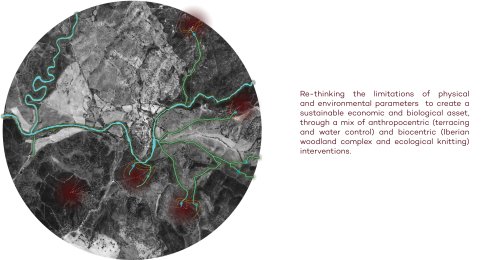Aldo Hasa
Tourism and the industrialisation of agriculture caused a major depopulation of Southern Europe's rural regions in the mid 20th century. This phenomenon is reflected in the rural regions of Portugal, where rural migration has drastically reduced the size of rural communities and in some cases caused complete human desertification. This dramatic change requires multiple and adaptable strategies that can provide sustainable approaches responding to future land use. These strategies involve deconstructing the components of the landscape such as topography, watershed, vegetation, and precipitation and reforming them in to a combined anthropocentric and biocentric programme of action.
Layer One
The implementation of Iberian woodland on hill summits; its primary function to capture rainfall and reduce run off, preventing soil erosion as well as providing opportunities for foraging economies and recreation.
Layer Two
Contour channels capturing and utilising excessive run off, diverting it as necessary to existing valley streams and to reservoirs, where it will be stored for future use. Re wilding valleys as ecological incubators.
Layer Three
The implementation of dams, which capture and store water in small reservoirs for irrigation in the dry season and as a contribution to the ecological diversity of the valleys.
Layer Four
Intensive sustainable terrace planting, adjacent to the contour channels, producing a wide range of crops for sale and processing at a local and commercial scale.
